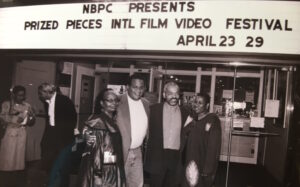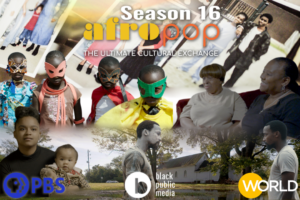 April 2, 2024
April 2, 2024
BLACK PUBLIC MEDIA
WEEKLY DISPATCH
By Leslie Fields-Cruz

It might be hard to imagine now, but it wasn’t long ago that millions of Americans acted as if the stories of Black people mattered only to Black folk. Elevating our stories in our voices, wasn’t a national piority. This sentiment was especially reflected in the programming decisions of early television.
The first network TV broadcast in the U.S. occurred in 1926. In those early days, few African Americans managed to enter the industry behind the camera worked. Those who did, either worked independently, passed for something other than Black, or worked in a subordinate role that lacked power, visibility and career mobility. By the time the Public Broadcasting Act was passed in 1967, the radio, film and industries were well established. Black people had only a scant presence in the media.
The National Black Programming Consortium (BPM’s original name) emerged a dozen years later with a mission of change.
Shifting the Landscape
Black Public Media remains the only organization exclusively devoted to developing Black content for distribution on public media. In the 45 years since we were founded, the landscape for Black stories and Black story tellers has shifted dramatically. And you can believe BPM has had a lot to do with that shift.
 AfroPoP: The Ultimate Cultural Exchange, PitchBLACK Forum & Awards, and AfroPoP Digital Shorts were created by Black Public Media to help elevate the work of talented media makers who are devoted to telling our stories. We elevate Black stories not only because it is vitally important to the health of our communities and our industry. We do it because we know American audiences want and appreciate these stories.
AfroPoP: The Ultimate Cultural Exchange, PitchBLACK Forum & Awards, and AfroPoP Digital Shorts were created by Black Public Media to help elevate the work of talented media makers who are devoted to telling our stories. We elevate Black stories not only because it is vitally important to the health of our communities and our industry. We do it because we know American audiences want and appreciate these stories.
April is our month to lift up and celebrate Black stories, and the people who make them. We invite you to join the festivities by watching AfroPoP Season 16, attending PitchBLACK (in person or virtually), streaming our digital shorts, and attending our Sam Pollard Film Retrospective events.
By showing up, you help us raise the visibility of this content and their makers. Ultimately, we want audiences across cultures and generations to have access and never question the value of our stories.
